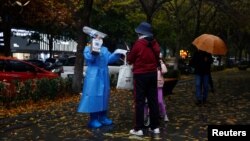Travelers arriving in China will spend less time in quarantine under changes to sweeping anti-virus controls announced Friday to reduce disruptions to the economy and society.
The announcement came as an upsurge in COVID-19 cases prompted Beijing to close parks and impose other restrictions. The country reported 10,729 new cases, and more than 5 million people were confined to their homes in the southern manufacturing hub of Guangzhou and the western megacity of Chongqing.
With the bulk of Beijing’s 21 million people undergoing near-daily testing, another 118 new cases were recorded in the sprawling city. Many city schools switched to online classes, hospitals restricted services and some shops and restaurants were shuttered with their staff taken to quarantine. Videos on social media showed people in some areas protesting or fighting with police and health workers.
“It has become normal, just like eating and sleeping," said food service worker Yang Zheng, 39. “I think what it impacts most is kids because they need to go to school.”
Demands for testing every 24 to 48 hours are “troublesome,” said Ying Yiyang, who works in marketing.
“My life is for sure not comparable to what it was three years ago,” Ying said.
Family trips out of Beijing can be difficult if the mandatory smartphone app that keeps track of the user’s virus test status and whereabouts doesn’t show the green code that authorizes travel back to the Chinese capital, Ying said.
“I just stay in Beijing,” Ying said.
Numerous villages on the capital's outskirts are home to blue-collar workers whose labor keeps the city running, with many living in dormitory communities. Taxi and ride-sharing drivers said they were avoiding the areas so as not to be placed in quarantine themselves.
Lockdowns in Guangzhou and elsewhere were due to end by Sunday, but authorities have repeatedly extended such restrictions with no explanation. Chinese leaders had promised on Thursday to respond to public frustration over the severe “zero-COVID” strategy that has confined millions to their homes and severely disrupted the economy.
Incoming passengers will only be quarantined for five days — rather than the previous seven — at a designated location, followed by three days of isolation at their place of residence, according to a notice from the State Council, China's Cabinet.
It wasn’t immediately clear when or where the rules would take effect and whether they would apply to foreigners and Chinese citizens alike.
Relaxed standards will also be applied to foreign businesspeople and athletes, in what appeared to be a gradual move toward normalization.
Airlines will no longer be threatened with a two-week suspension of flights if five or more passengers test positive, the regulations said, potentially providing a major expansion of seats on such flights that have shrunk in numbers and soared in price since restrictions were imposed in 2020.




